
Pahang, officially Pahang Darul Makmur with the Arabic honorific Darul Makmur is a sultanate and a federal state of Malaysia. It is the third largest state in the country and the largest state in Peninsular Malaysia, and the ninth most populous. The state occupies the basin of the Pahang River, and a stretch of the east coast as far south as Endau. The state borders the Malaysian states of Kelantan and Terengganu to the north, Perak, Selangor and Negeri Sembilan to the west and Johor to the south, with the South China Sea is to the east. Pahang is separated from the west coast states by the Titiwangsa Mountains that forms a natural divider between the peninsula's east and west coasts from north to south, and from Terengganu in the east by the Pantai Timur Range. The state's highest elevation culminates at Mount Tahan in the eponymous Tahan Range, which is 2,187 metres (7,175 ft) high. Although two thirds of the state is covered by dense rain forest, its central plains are intersected by numerous rivers, and along the coast there is a 32-kilometre (20 mi) wide expanse of alluvial soil that includes the deltas and estuarine plains of the Kuantan, Pahang, Rompin, Endau, and Mersing Rivers.

Sultan Haji Ahmad Shah Al-Musta’in Billah ibni Almarhum Sultan Abu Bakar Ri’ayatuddin Al-Mu’azzam Shah was Sultan of Pahang from 1974 until his abdication in 2019, and the seventh Yang di-Pertuan Agong, from 1979 to 1984. His abdication as sultan was decided by the Royal Council at an extraordinary meeting on 11 January 2019. A special amendment was passed on the state constitution that gave the body more power for this decision, citing the Sultan's incapability to rule due to his failing health. The abdication was announced the next day which was retroactively effective on the day of the Royal Council meeting, paving the way to his son, Abdullah to succeed him as sultan immediately, and subsequently be elected as the next Yang di-Pertuan Agong later the same month.

Tengku Ampuan Hajah Afzan Rahimahallah binti Almarhum Tengku Panglima Perang Tengku Muhammad was the Tengku Ampuan of Pahang. She served as Raja Permaisuri Agong of Malaysia between 26 April 1979 and 25 April 1984.
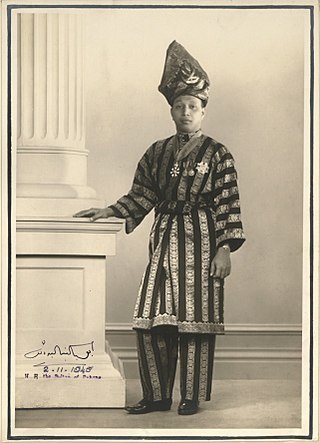
Sultan Abu Bakar Ri’ayatuddin Al-Mu’azzam Shah Ibni Al-Marhum Sultan Abdullah Al-Mu’tassim Billah Shah, was the fourth modern Sultan of Pahang.

Dato’ Sheila Majid, is a Malaysian pop singer who is best known for her 1986 song, "Sinaran". Her musical prowess especially in the genre of jazz music has led her to be dubbed as Malaysia's Queen of Jazz.

Kuantan is a city and the state capital of Pahang, Malaysia. It is located near the mouth of the Kuantan River. Kuantan is the 14th largest city in Malaysia based on a 2020 population of 548,014 and the largest city on the East Coast of Peninsular Malaysia.
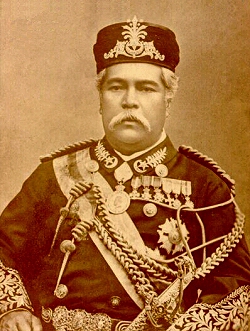
Sultan Sir Abu Bakar Al-Khalil Ibrahim Shah ibni Almarhum Maharaja Tun Daeng Ibrahim was the Temenggong of Johor. He was the 1st sultan of modern Johor, the 21st Sultan of Johor and the first Maharaja of Johor from the House of Temenggong. He was also informally known as "The Father of Modern Johor", as many historians accredited Johor's development in the 19th century to Abu Bakar's leadership. He initiated policies and provided aids to ethnic Chinese entrepreneurs to stimulate the development of the state's agricultural economy which was founded by Chinese migrants from southern China in the 1840s. He also took charge of the development of Johor's infrastructure, administrative system, military and civil service, all of which were modelled closely along Western lines.
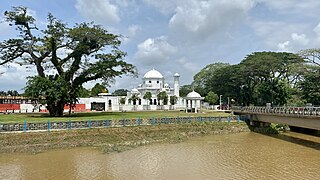
Pekan is a town in Pekan District, Pahang, Malaysia. It is also the royal capital of the state. Its name comes from a flower, the Bunga Pekan. Pekan is also the name of the district the town is situated in, and a parliamentary constituency in its own right. It is the home of the state's royal family headed by Sultan Abdullah of Pahang. It is also the hometown of the second Prime Minister of Malaysia, Tun Abdul Razak Hussein.

The National Museum is a public museum in Kuala Lumpur, Malaysia dedicated to Malaysian art, culture, and history. Located on Jalan Damansara close to Perdana Lake Gardens across KL Sentral station. Its façade comprises elements from both traditional Malay and modern features. It was inaugurated on 31 August 1963, and it serves as a repository of Malaysia's cultural and historical heritage.

Federal Route 3 is a main federal road running along the east coast of Peninsula Malaysia. The 739 kilometres (459 mi) federal highway connects Rantau Panjang in Kelantan until Johor Bahru in Johor. The entire FT3 highway is gazetted as a part of the Asian Highway Network route 18.
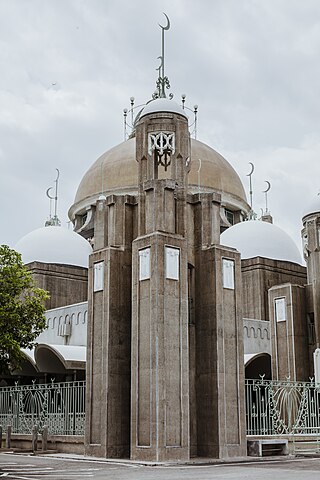
Sultan Sulaiman Royal Mosque is Selangor's royal mosque, which is located in Klang, Selangor, Malaysia. It was constructed by the British in the early 1932 and was officially opened in 1933 by the late Almarhum Sultan Sir Alaeddin Sulaiman Shah.

This article lists important figures and events in Malayan and Malaysian public affairs during the year 1963, together with births and deaths of significant Malaysians. The Federation of Malaya merged with Singapore, North Borneo, and Sarawak to form the Federation of Malaysia on 16 September.

The Abu Bakar Royal Mosque is Pahang's royal mosque which is located in Pekan, Pahang, Malaysia. It was officially opened in 1976 by Sultan Ahmad Shah of Pahang replacing the nearby Abdullah Mosque or Old Royal Mosque.
The Abu Bakar Bridge is the main bridge on Pahang River near Pekan, Pahang, Malaysia. It is located at Jalan Kuantan-Pekan. Construction started in 1968 and was completed two years later, with the total cost of RM2.5 million. The bridge was opened on 28 February 1970 by Almarhum Sultan Abu Bakar of Pahang.

Al-Sultan Abdullah Ri'ayatuddin Al-Mustafa Billah Shah ibni Almarhum Sultan Haji Ahmad Shah is the Sultan of Pahang.
Sultan ʽAbdullah Al-Muʽtassim Billah Shah Ibni Al-Marhum Sultan Ahmad Al-Muʽazzam Shah was the third modern Sultan of Pahang reigning from 1917 to 1932.
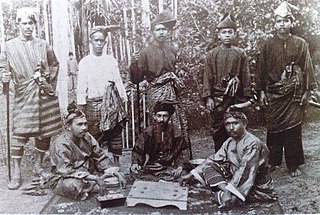
Pahang Malays are a sub-group of Malay people native to the state of Pahang, in the east coast of Peninsular Malaysia. With population of approximately 1.08 million people, they constitutes 70% of Pahang state's population, making them the dominant ethnic group in the state. Their language, Pahang Malay is one of many Malayan languages spoken in the region that belong to the Malayo-Polynesian group of Austronesian family.

Belait District Museum is a cultural and history museum located at Jalan Maulana, Kuala Belait, Belait District of Brunei.
Yaakub Isa was a Malaysian teacher, writer, scholar of the Malay language and literature.





















